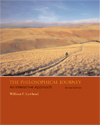 |  The Philosophical Journey, 2/e William Lawhead,
The University of Mississippi
The Search for Knowledge
Chapter ObjectivesUpon completion of this chapter you should be able to:
| 1. explain what epistemology is |
 |  |  | | 2. distinguish between Cartesian and Humean skepticism |
 |  |  | | 3. identify three anchor points of rationalism and indicate how these are illustrated in the thought of Socrates, Plato, and Descartes |
 |  |  | | 4. identify three anchor points of empiricism and relate these to the views of Locke, Berkeley, and Hume |
 |  |  | | 5. show how Kant's constructivist epistemology steers a middle course between rationalism and empiricism |
 |  |  | | 6. discuss and critique several varieties of epistemic relativism, especially Nietzsche's radical perspectivism |
 |  |  | | 7. explain how pragmatism introduces a significantly new perspective into traditional epistemology |
 |  |  | | 8. describe some common criticisms of traditional epistemology made by feminists |
|



 2003 McGraw-Hill Higher Education
2003 McGraw-Hill Higher Education